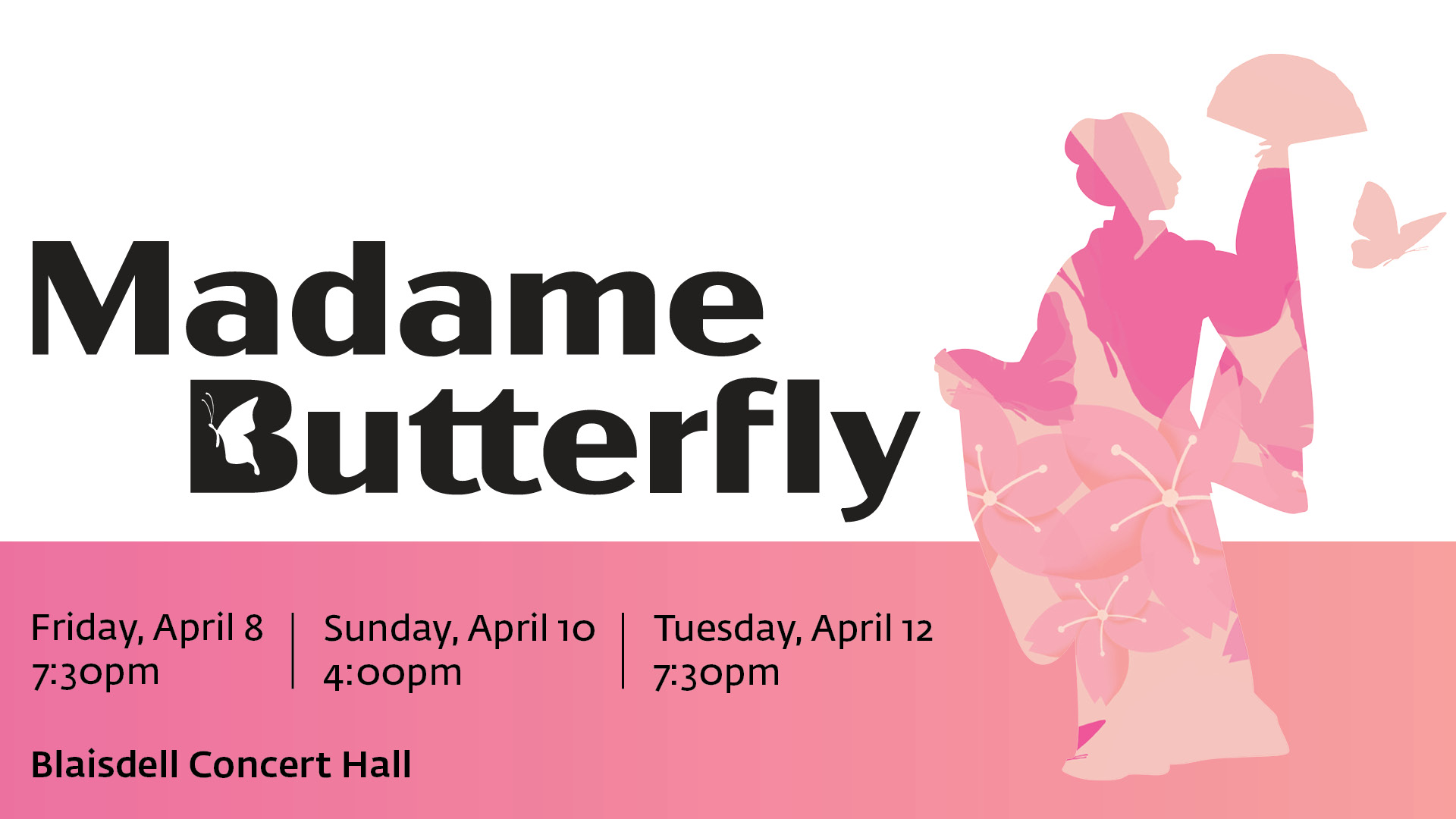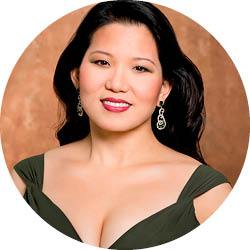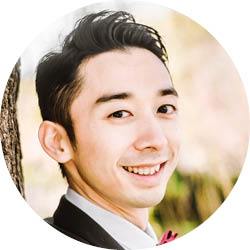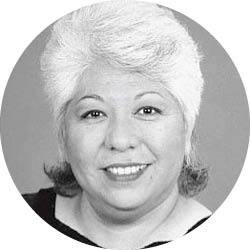Madame Butterfly

By Giacomo Puccini
Sung in Italian with English & Japanese Supertitles
Approximately 3 hours | Two Intermissions
Single Tickets Start at Just $30
Get Tickets
HOT’s season comes to a stunning close with Puccini’s Madame Butterfly, one of opera’s most beloved works. Bound by tradition and honor, a young Japanese geisha is left to face an aftermath when abandoned by a reckless American naval officer. Puccini’s haunting score is filled with unforgettable music of unparalleled beauty and pathos that will stay with you long after you’ve left the theatre.
Karen Cha-ling Ho makes her role debut as Cio-Cio-san, with John Pickle as Pinkerton, Alice Chung as Suzuki, and Levi Hernandez as Sharpless. Director Gregory Keller brings the production to life with Benjamin Makino conducting and Japanese-inspired costumes by Honolulu fashion designer Anne Namba.
MADAME BUTTERFLY
FRIDAY, APRIL 8 AT 7:30PM
SUNDAY, APRIL 10 AT 4:00PM
TUESDAY, APRIL 12 AT 7:30PM
NEAL S. BLAISDELL CONCERT HALL
Season subscriptions are available through the HOT Box Office. Subscribers and ticket buyers with questions or concerns can contact the HOT Box Office at 808.596.7858 or hottickets@hawaiiopera.org.
Note to attendees: Current audience guidelines to safely welcome patrons back to the theatre can be found on the HOT website at hawaiiopera.org/plan-your-visit.
Mahalo to Our Sponsors
Madame Butterfly is made possible, in part, by the generous support of the Henry Akina Fund, Atherton Family Foundation, Halekulani Corporation, John R. Halligan Charitable Fund, Hawai’i Public Radio, iHeart Media, McInerny Foundation, the National Endowment for the Arts, The Arthur and Mae Orvis Foundation Inc, Pasha Hawai’i, Tateuchi Foundation, Clifford K.H. & Adrienne Wing Lau, and John Young Foundation.
Watch the Trailer!
MEET THE CAST & ARTISTIC TEAM
 Karen Chia-Ling Ho | Cio-Cio-san
Hometown: Taipei, Taiwan
Recent & Upcoming Productions
• Princess Jia, Dream of the Red Chamber (San Francisco Opera)
• Meretaten, Akhnaten (Metropolitan Opera)
• Crowned Child, Macbeth (Metropolitan Opera)
• Soloist, Mozart's Requiem (Philharmonia Orchestra of New York)
Career Highlights
•Metropolitan Opera National Council Auditions Winner, South Carolina & Southeast Regional Finals
• Maria, Der Diktator (American Symphony Orchestra, Carnegie Hall Debut)
• Recipient of the Renee Fleming Award from the Eastman School of Music
HOT Debut
• Yes
Karen Chia-Ling Ho | Cio-Cio-san
Hometown: Taipei, Taiwan
Recent & Upcoming Productions
• Princess Jia, Dream of the Red Chamber (San Francisco Opera)
• Meretaten, Akhnaten (Metropolitan Opera)
• Crowned Child, Macbeth (Metropolitan Opera)
• Soloist, Mozart's Requiem (Philharmonia Orchestra of New York)
Career Highlights
•Metropolitan Opera National Council Auditions Winner, South Carolina & Southeast Regional Finals
• Maria, Der Diktator (American Symphony Orchestra, Carnegie Hall Debut)
• Recipient of the Renee Fleming Award from the Eastman School of Music
HOT Debut
• Yes
 John Pickle | Pinkerton
Hometown: Akron, Ohio
Recent & Upcoming Productions
• Title Role, Les Contes d'Hoffmann (Opera Louisiane)
• Tenor, Re-Emerging: HOT Live in Concert (Hawai'i Opera Theatre)
• Soloist, Beethoven’s Symphony No. 9 (Canton Symphony)
• Soloist, Mozart's Requiem (Pacific Symphony)
Career Highlights
• Erik, Der fliegende Holländer (Los Angeles Opera)
• 2008 Carnegie Hall debut, Schubert's Mass in G Major
• Featured on several operetta recordings for Albany Records and Newport Classic labels
HOT Debut
• Re-Emerging: HOT Live in Concert (March 2022)
John Pickle | Pinkerton
Hometown: Akron, Ohio
Recent & Upcoming Productions
• Title Role, Les Contes d'Hoffmann (Opera Louisiane)
• Tenor, Re-Emerging: HOT Live in Concert (Hawai'i Opera Theatre)
• Soloist, Beethoven’s Symphony No. 9 (Canton Symphony)
• Soloist, Mozart's Requiem (Pacific Symphony)
Career Highlights
• Erik, Der fliegende Holländer (Los Angeles Opera)
• 2008 Carnegie Hall debut, Schubert's Mass in G Major
• Featured on several operetta recordings for Albany Records and Newport Classic labels
HOT Debut
• Re-Emerging: HOT Live in Concert (March 2022)
 Alice Chung | Suzuki
Hometown: Loma Linda, California
Recent & Upcoming Productions
• Granny Jia (cover), Dream of the Red Chamber (San Francisco Opera)
• Maddalena, Rigoletto (Academy of Vocal Arts)
• Soloist, Mahler’s Symphony No. 2 (United States Naval Academy)
• Mercédès; Carmen (cover), Carmen (Tulsa Opera)
Career Highlights
• Winner 2021 William Matheus Sullivan Foundation Audition Awards
• 2019 Merola Opera Program Alumnus
• Founder, Wear Yellow Proudly
HOT Debut
• Yes
Alice Chung | Suzuki
Hometown: Loma Linda, California
Recent & Upcoming Productions
• Granny Jia (cover), Dream of the Red Chamber (San Francisco Opera)
• Maddalena, Rigoletto (Academy of Vocal Arts)
• Soloist, Mahler’s Symphony No. 2 (United States Naval Academy)
• Mercédès; Carmen (cover), Carmen (Tulsa Opera)
Career Highlights
• Winner 2021 William Matheus Sullivan Foundation Audition Awards
• 2019 Merola Opera Program Alumnus
• Founder, Wear Yellow Proudly
HOT Debut
• Yes
 Levi Hernandez | Sharpless
Hometown: El Paso, Texas
Recent & Upcoming Productions
• Il Conte di Almaviva, The Marriage of Figaro (Intermountain Opera Bozeman)
• Alvaro, Florencia in the Amazons (Lyric Opera of Chicago)
• Title Role, Gianni Schicchi (Tulsa Opera)
• Rappaccini, La hija de Rappaccini (Chicago Opera Theatre)
Career Highlights
• Papageno, The Magic Flute (Opera Theatre of Saint Louis)
• Guglielmo, Cosí fan tutte (Spoleto Festival USA)
• Rambaldo, La rondine (Minnesota Opera)
HOT Debut
• Yes
Levi Hernandez | Sharpless
Hometown: El Paso, Texas
Recent & Upcoming Productions
• Il Conte di Almaviva, The Marriage of Figaro (Intermountain Opera Bozeman)
• Alvaro, Florencia in the Amazons (Lyric Opera of Chicago)
• Title Role, Gianni Schicchi (Tulsa Opera)
• Rappaccini, La hija de Rappaccini (Chicago Opera Theatre)
Career Highlights
• Papageno, The Magic Flute (Opera Theatre of Saint Louis)
• Guglielmo, Cosí fan tutte (Spoleto Festival USA)
• Rambaldo, La rondine (Minnesota Opera)
HOT Debut
• Yes
 Taka Komagata | Goro
Hometown: Honolulu, Hawai'i
Recent & Upcoming Productions
• Radames, Aida Touring Production (Hawai'i Opera Theatre)
• Ellis Opera (Guerilla Opera)
• Bastien, Bastien & Bastienne (Hawai'i Opera Theatre)
• Male Lead, I’ll Be Home for Christamas (Asakusa Kyugeki Theater)
Career Highlights
• HOT Mae Z. Orvis Opera Studio Artist
• Rinuccio, Gianni Schicchi (Varna International Opera Academy)
• Soloist, Mozart’s Great Mass in C minor (Varna International Music Academy Orchestra)
• Mr. Foster, The Séance (Hartford Opera Theater)
HOT Debut
• Yes
Taka Komagata | Goro
Hometown: Honolulu, Hawai'i
Recent & Upcoming Productions
• Radames, Aida Touring Production (Hawai'i Opera Theatre)
• Ellis Opera (Guerilla Opera)
• Bastien, Bastien & Bastienne (Hawai'i Opera Theatre)
• Male Lead, I’ll Be Home for Christamas (Asakusa Kyugeki Theater)
Career Highlights
• HOT Mae Z. Orvis Opera Studio Artist
• Rinuccio, Gianni Schicchi (Varna International Opera Academy)
• Soloist, Mozart’s Great Mass in C minor (Varna International Music Academy Orchestra)
• Mr. Foster, The Séance (Hartford Opera Theater)
HOT Debut
• Yes
 Robert Feng | Prince Yamadori & Il Bonzo
Hometown: Kailua, Hawai'i
Recent & Upcoming Productions
• Bobbie Fe, I'll Be Seeing You (Hawai'i Opera Theatre)
• Anna Bolena (Dell'Arte Opera Ensemble)
• Bass, Re-Emerging: HOT Live in Concert (Hawai'i Opera Theatre)
• Mad Hatter, The Garden of Alice (City Lyric Opera)
Career Highlights
• HOT Mae Z. Orvis Opera Studio Artist
• Il Commendatore, Don Giovanni (Opera on the Rocks)
• Don Alfonso, Così fan tutte (Opera Alchemy)
• George Woodhead Prize in Voice Recipient
HOT Debut
• Re-Emerging: HOT Live in Concert (March 2022)
Robert Feng | Prince Yamadori & Il Bonzo
Hometown: Kailua, Hawai'i
Recent & Upcoming Productions
• Bobbie Fe, I'll Be Seeing You (Hawai'i Opera Theatre)
• Anna Bolena (Dell'Arte Opera Ensemble)
• Bass, Re-Emerging: HOT Live in Concert (Hawai'i Opera Theatre)
• Mad Hatter, The Garden of Alice (City Lyric Opera)
Career Highlights
• HOT Mae Z. Orvis Opera Studio Artist
• Il Commendatore, Don Giovanni (Opera on the Rocks)
• Don Alfonso, Così fan tutte (Opera Alchemy)
• George Woodhead Prize in Voice Recipient
HOT Debut
• Re-Emerging: HOT Live in Concert (March 2022)
 Ian McGuffin | The Imperial Commissioner
Hometown: Kentucky
Recent & Upcoming Productions
• Abraham Fleischman, Hometown to the World
(Hawai‘i Opera Theatre)
• Baritone, Re-Emerging: HOT Live in Concert (Hawai'i Opera Theatre)
• I McGuff, I'll Be Seeing You (Hawai'i Opera Theatre)
Career Highlights
• HOT Mae Z. Orvis Opera Studio Artist
• Count Almaviva, Le Nozze di Figaro (Miami Summer Music Festival)
• Marcello, La Bohème (Tuscia Opera Festival)
HOT Debut
• Re-Emerging: HOT Live in Concert (March 2022)
Ian McGuffin | The Imperial Commissioner
Hometown: Kentucky
Recent & Upcoming Productions
• Abraham Fleischman, Hometown to the World
(Hawai‘i Opera Theatre)
• Baritone, Re-Emerging: HOT Live in Concert (Hawai'i Opera Theatre)
• I McGuff, I'll Be Seeing You (Hawai'i Opera Theatre)
Career Highlights
• HOT Mae Z. Orvis Opera Studio Artist
• Count Almaviva, Le Nozze di Figaro (Miami Summer Music Festival)
• Marcello, La Bohème (Tuscia Opera Festival)
HOT Debut
• Re-Emerging: HOT Live in Concert (March 2022)
 Phil Hidalgo | Il Registrare
Hometown: Honolulu, Hawai‘i
Career Highlights
• Musical Director for several musicals at Diamond Head Theatre
• Artistic Director for the Gay Men’s Chorus of Honolulu
• Accompanist for Hawai‘i Youth Opera Chorus and the University of Hawai‘i at Mānoa Dance Dept
• Member of the HOT Chorus
• Po‘okela Award Winner
HOT Debut
• Andrea Chenier (February 1992)
Phil Hidalgo | Il Registrare
Hometown: Honolulu, Hawai‘i
Career Highlights
• Musical Director for several musicals at Diamond Head Theatre
• Artistic Director for the Gay Men’s Chorus of Honolulu
• Accompanist for Hawai‘i Youth Opera Chorus and the University of Hawai‘i at Mānoa Dance Dept
• Member of the HOT Chorus
• Po‘okela Award Winner
HOT Debut
• Andrea Chenier (February 1992)
 Laurie Rubin | Kate Pinkerton
Hometown: Honolulu, Hawai‘i
Recent & Upcoming Productions
• Solo Recital (Ravinia Festival)
• Penelope, The Return of Ulysses (Greenwich Music Festival)
• Title Role, La Cenerentola
Career Highlights
• Co-Founder & Co-Artistic Director, Ohana Arts
• Collaborator, Peace On Your Wings
• Author, Do You Dream in Color? Insights From a Girl Without Sight
HOT Debut
• Yes
Laurie Rubin | Kate Pinkerton
Hometown: Honolulu, Hawai‘i
Recent & Upcoming Productions
• Solo Recital (Ravinia Festival)
• Penelope, The Return of Ulysses (Greenwich Music Festival)
• Title Role, La Cenerentola
Career Highlights
• Co-Founder & Co-Artistic Director, Ohana Arts
• Collaborator, Peace On Your Wings
• Author, Do You Dream in Color? Insights From a Girl Without Sight
HOT Debut
• Yes
 Benjamin Makino | Conductor
Hometown: Fullerton, California
Recent & Upcoming Productions
• Both Eyes Open (Presidio Theatre)
• Hometown to the World (Hawai'i Opera Theatre)
• The Love Potion (Long Beach Opera)
Career Highlights
• Former Music Director of Opera Memphis
• 2015 Memphis Business Bureau’s 40 Under 40
• Led establishment and debut performances of PRIZM Chamber Orchestra
HOT Debut
• La Traviata (May 2019)
Benjamin Makino | Conductor
Hometown: Fullerton, California
Recent & Upcoming Productions
• Both Eyes Open (Presidio Theatre)
• Hometown to the World (Hawai'i Opera Theatre)
• The Love Potion (Long Beach Opera)
Career Highlights
• Former Music Director of Opera Memphis
• 2015 Memphis Business Bureau’s 40 Under 40
• Led establishment and debut performances of PRIZM Chamber Orchestra
HOT Debut
• La Traviata (May 2019)
 Gregory Keller | Director
Hometown: Los Angeles, California
Recent & Upcoming Productions
• La Boheme (Jacksonville Symphony)
• The Pirates of Penzance (Cedar Rapids Opera Theatre)
• Don Carlos (Metropolitan Opera)
Career Highlights
• 26 Seasons as Stage Director at the Metropolitan Opera
• Cosí fan tutte (Houston Grand Opera’s Studio Program)
• Creator & Director, Patriot Act (New York Theatre Workshop)
HOT Debut
• Yes
Gregory Keller | Director
Hometown: Los Angeles, California
Recent & Upcoming Productions
• La Boheme (Jacksonville Symphony)
• The Pirates of Penzance (Cedar Rapids Opera Theatre)
• Don Carlos (Metropolitan Opera)
Career Highlights
• 26 Seasons as Stage Director at the Metropolitan Opera
• Cosí fan tutte (Houston Grand Opera’s Studio Program)
• Creator & Director, Patriot Act (New York Theatre Workshop)
HOT Debut
• Yes
 Nola A. Nāhulu | Chorus Director
Hometown: Makaha, Hawai'i
Recent & Upcoming Productions
• Annual performances by HYOC & Kawaiaha'o Church
• HYOC's 60th Annual Holiday Concert
• Chorus Director, Re-Emerging: HOT Live in Concert (Hawai'i Opera Theatre)
Career Highlights
• Debut of eight Hawaiian Youth Operas for the Hawai'i Youth Opera Chorus
• Debut of KINOHI-First Hawaiian a cappella Oratorio by Herb Mahelona Jr.
• Began preparing HOT's Choruses with Beebe Freitas in 1990
HOT Debut
• Tosca (October 2019)
Nola A. Nāhulu | Chorus Director
Hometown: Makaha, Hawai'i
Recent & Upcoming Productions
• Annual performances by HYOC & Kawaiaha'o Church
• HYOC's 60th Annual Holiday Concert
• Chorus Director, Re-Emerging: HOT Live in Concert (Hawai'i Opera Theatre)
Career Highlights
• Debut of eight Hawaiian Youth Operas for the Hawai'i Youth Opera Chorus
• Debut of KINOHI-First Hawaiian a cappella Oratorio by Herb Mahelona Jr.
• Began preparing HOT's Choruses with Beebe Freitas in 1990
HOT Debut
• Tosca (October 2019)
SYNOPSIS
MADAME BUTTERFLY
ACT I.
Lieutenant B. F. Pinkerton of the U. S. Navy inspects a house overlooking Nagasaki harbor that he is leasing from Goro, a marriage broker. The house comes with three servants and a geisha wife known as Butterfly (Cio-Cio san). The lease runs for nine hundred and ninety-nine years, subject to monthly renewal. The American consul Sharpless arrives breathless from climbing the hill. Pinkerton describes how he, like other Yankees, roams the world in search of experience and pleasure (“Dovunque al mondo”). He is not sure whether his feelings for the young girl are love or a whim, but he intends to go through with the marriage ceremony. Sharpless warns him that the girl may view the marriage differently, but Pinkerton brushes off such concerns and says someday he will take a real, American wife. He offers the consul whiskey and proposes a toast (“America forever!”). Butterfly is heard climbing the hill with her friends for the ceremony. In casual conversation after the formal introduction, Butterfly admits her age—fifteen—and explains that her family was once prominent but lost its position. Cio-Cio san, consequently, has had to earn her living as a geisha. Her relatives arrive and chatter about the marriage. Cio-Cio san shows Pinkerton her few possessions and quietly tells him she has been to the Christian mission and will embrace her husband’s religion. The Imperial Commissioner recites the marriage agreement, and the relatives congratulate the couple. Suddenly, a threatening voice is heard from afar—it is the Bonze, Butterfly’s uncle, a priest. He curses the girl for going to the Christian mission and rejecting her ancestral religion. Pinkerton orders the Bonze and the guests away, and the shocked relatives denounce her as they leave. He tries to console Butterfly with sweet words. She is helped by Suzuki out of her wedding kimono and joins Pinkerton in the garden, where they anticipate the night ahead of them (“Vieni la sera”).
ACT II.
Part I.
Three years have passed, and Cio-Cio san is still waiting for her husband’s return. Suzuki prays to the gods for help, but Butterfly berates her for believing in lazy Japanese gods rather than in Pinkerton’s promise to return one day (“Un bel dì”). Sharpless appears with a letter from Pinkerton, but before he can read it to Butterfly, Goro arrives with the latest potential husband for Butterfly, the wealthy Prince Yamadori. Butterfly insists she is not available for marriage as her American husband has not deserted her. The three men privately discuss that Pinkerton’s ship is due in port soon. Butterfly politely serves tea to Sharpless, but snubs Yamadori and then unceremoniously dismisses the ever-hopeful suitor. Sharpless attempts to read Pinkerton’s letter and warns that the officer may never return; perhaps, he suggests, she should reconsider Yamadori’s offer. “And this?” asks the outraged Butterfly (“E questo?”), presenting her small child to the consul. Sharpless, too upset to tell her more of the letter’s contents, leaves, promising to tell Pinkerton of the child. A cannon shot is heard in the harbor, announcing the arrival of a ship. Butterfly and Suzuki take a telescope to the terrace and read the name of Pinkerton’s ship. Overjoyed, they strew the house with flowers, and Suzuki dresses Butterfly as she was on her wedding night (“Scuoti della fronda”). Night falls, and Butterfly, Suzuki, and the child settle into a vigil over the harbor (Humming Chorus).
Part II.
Dawn breaks, and Suzuki insists that Butterfly get some sleep. Butterfly brings the child into another room. Sharpless appears with Pinkerton and Kate—Pinkerton’s new wife. Suzuki realizes who the American woman is and agrees to help break the news to Butterfly. Pinkerton is overcome with guilt and runs from the scene, pausing to remember his days in the little house (“Addio fiorito asil”). Cio-Cio san rushes in hoping to find Pinkerton but sees Kate instead. Grasping the situation, she agrees to give up the child but insists Pinkerton return for him. Dismissing everyone, Butterfly takes out the dagger with which her father had committed suicide, choosing, like him, to die with honor rather than live in shame. She is interrupted momentarily when the child comes in, and Butterfly says a final goodbye to him (“Tu, piccolo iddio”). She stabs herself as the returning Pinkerton calls her name.

